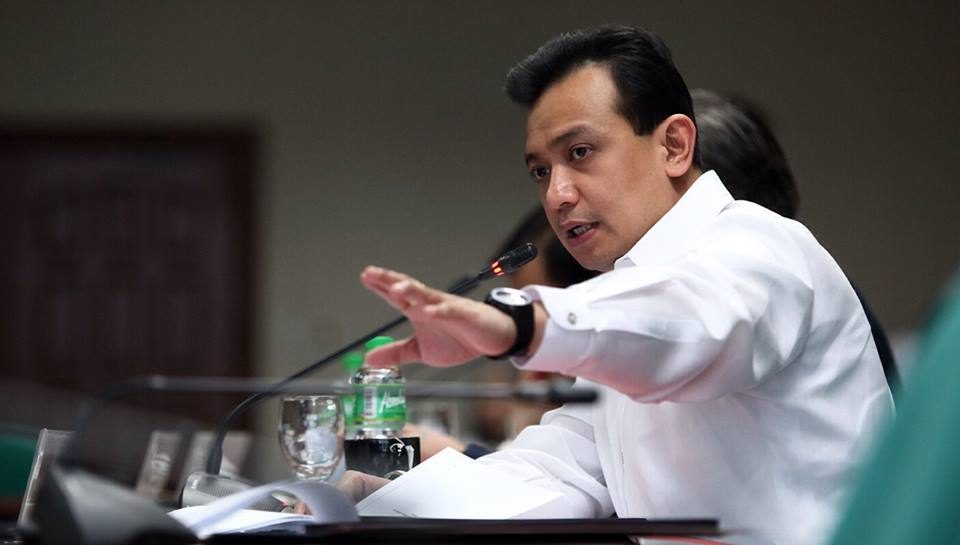SUMMARY
This is AI generated summarization, which may have errors. For context, always refer to the full article.

MANILA, Philippines – The Supreme Court (SC) upheld on Wednesday, April 3, the validity of former senator Antonio Trillanes IV’s amnesty.
In a decision penned by Associate Justice Maria Filomena Singh, the SC en banc ruled that former president Rodrigo Duterte’s Proclamation No. 527, which revoked the former senator’s amnesty, was unconstitutional.
The High Court explained that a sitting president cannot revoke a granted amnesty without the Congress’ concurrence. In deciding in Trillanes’ case, the SC said it grounded on the “primacy of Bill of Rights” and “reaffirmed that neither the government nor any of its officials, including the President, are above the law.”
The SC added that the revocation of the amnesty, after it became final and without prior notice, violated the former senator’s constitutional right to due process. Duterte’s proclamation, which sought to revive Trillanes’ criminal cases that had already been dismissed, violated the former lawmaker’s rights against ex post facto laws and double jeopardy.
An ex post facto law, which is prohibited under the 1987 Constitution, is equivalent to penalizing a person for an act that may be illegal for a certain time, but was not illegal when the alleged crime was committed. The right against double jeopardy, meanwhile, ensures that a person will not be prosecuted for the same crime.
In addition, the SC said there was convincing evidence that Trillanes filed his amnesty application. The SC also noted that Duterte’s decision to revoke only Trillanes’ amnesty, even though the application forms of other amnesty grantees were also not available, was a violation of the former senator’s right to equal protection of the laws.
“The decision affirms that in balancing the exercise of presidential prerogatives and the protection of the citizens’ rights, the Constitution and the laws remain as the Court’s anchor and rudder,” the ruling read.
What happened before
Trillanes’ amnesty was granted by late former president Benigno Aquino III through Proclamation No. 50 in 2010. The order also granted amnesty to others involved in the Oakwood mutiny in 2003 and the Manila Peninsula incident in 2007.
Aquino granted the amnesty “to promote an atmosphere conducive to the attainment of a just, comprehensive and enduring peace and in line with the government’s peace and reconciliation initiatives.” The then-president later issued Proclamation No. 75 in November 2010 that superseded his Proclamation No. 50. Both chambers of Congress concurred in the proclamation.
In 2018, Duterte signed a proclamation that revoked the amnesty of one of his most vocal critics. He also ordered the Department of Justice (DOJ) and the Armed Forces of the Philippines “to pursue all criminal and administrative cases” against the former soldier.
Trillanes’ amnesty case reached several levels of courts – from trial to the High Court.
Judge Andres Soriano of the Makati City Regional Trial Court Branch 148 contradicted Duterte in 2018 and junked the DOJ’s request to have Trillanes arrested. However, Soriano upheld that Duterte was within his power to issue the proclamation.
When the case reached the Court of Appeals (CA), the appellate court sided with Trillanes in 2021 but did not invalidate Duterte’s proclamation. The CA said Duterte’s order did not violate the equal protection clause and the right against double jeopardy.
The SC ruling is important because it explicitly said that Duterte’s proclamation was unconstitutional, and noted that the order violated Trillanes’ rights to equal protection and against double jeopardy and ex post facto laws. – Rappler.com
1 comment
How does this make you feel?







I appreciate the Supreme Court’s decision on the validity of former senator Antonio Trillanes IV’s amnesty. I agree that it is grounded on the “primacy of the Bill of Rights” and “reaffirmed that neither the government nor any of its officials, including the President, are above the law.” I believe this will anger former President Digong Duterte after his belief that he is above the law has been rebuked.